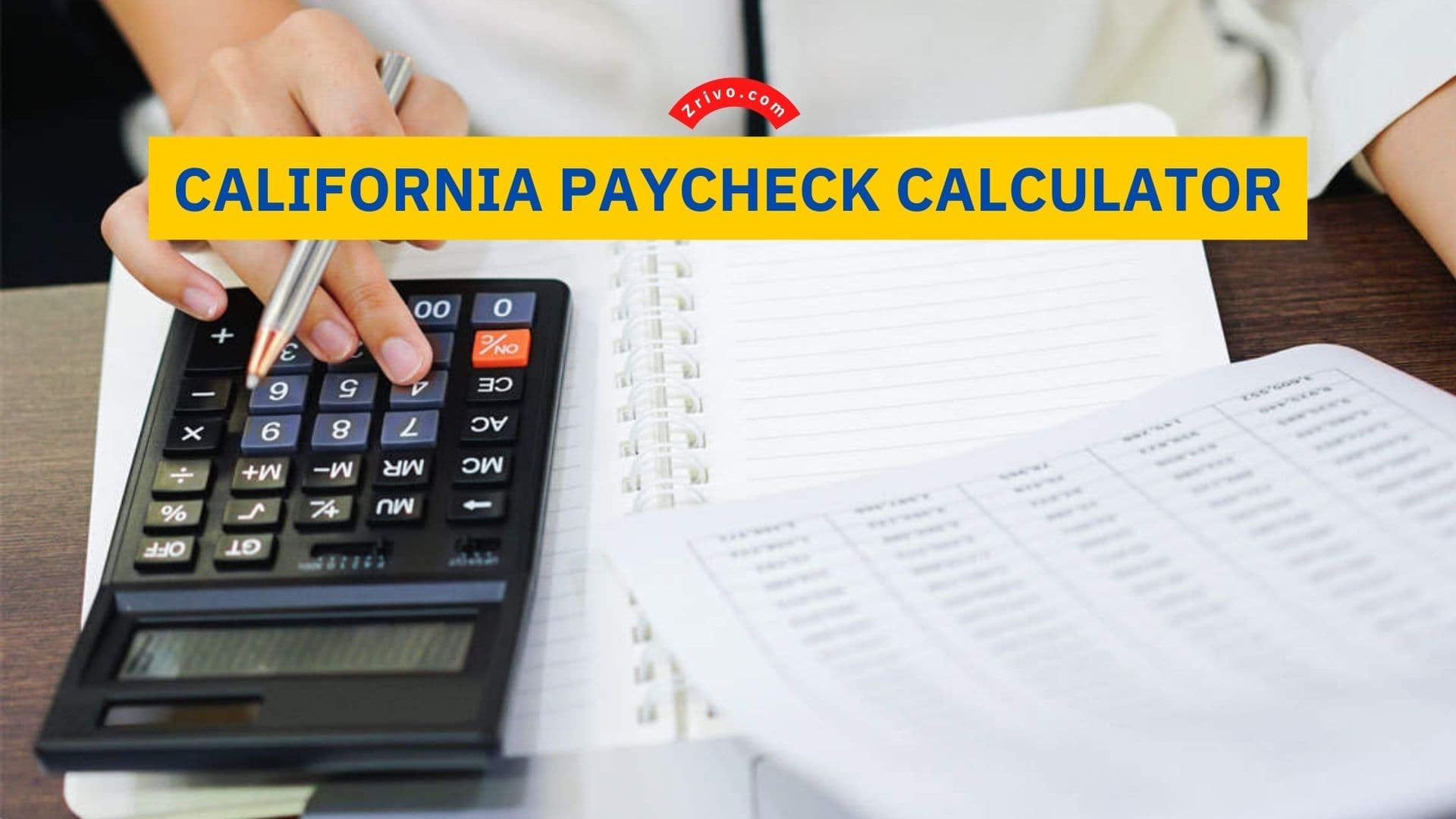Ever wondered how much you'll actually take home after taxes in California? Well, buckle up because we're diving deep into the world of California paycheck calculators after taxes. Whether you're a newbie to the workforce or a seasoned pro, understanding your paycheck is crucial. It's not just about knowing how much you earn—it's about mastering your financial health.
Imagine this: you just got that sweet job offer in California, and your mind is racing with thoughts of beach days, hikes, and maybe even a little shopping spree. But wait—what about those taxes? Don't let the numbers confuse you. This guide will break it all down so you can focus on the good stuff.
Our goal here is simple: to give you the tools and knowledge you need to calculate your paycheck after taxes accurately. From federal and state taxes to deductions and credits, we've got your back. So, let's get started, shall we?
- Kim Kardashian Boyfriends A Deep Dive Into Her Love Life Journey
- Payton Pritchard Wife The Untold Story Behind The Nba Stars Love Life
Why Understanding California Paycheck Calculator After Taxes Matters
Let's face it—taxes can be tricky, especially in a state like California where both state and federal taxes come into play. Knowing how to calculate your paycheck after taxes isn't just about curiosity; it's about taking control of your finances. Here's why it matters:
First off, understanding your paycheck helps you budget better. If you know exactly how much you'll take home, you can plan for rent, groceries, and those weekend getaways. Plus, it gives you peace of mind knowing that you're not leaving any money on the table.
Now, let's talk about the bigger picture. When you understand your paycheck, you're better equipped to make informed decisions about retirement plans, investments, and even tax credits. It's all about being smart with your hard-earned cash.
- Is February 21 Pisces Or Aquarius Unveiling The Zodiac Mystery
- Dan Abrams First Wife The Untold Story Behind The Scenes
Breaking Down the Components of Your Paycheck
Before we dive into the nitty-gritty of calculating your paycheck after taxes, let's break down the key components:
- Gross Pay: This is the total amount you earn before any deductions.
- Federal Taxes: Uncle Sam takes a cut, and it depends on your income bracket.
- State Taxes: California has its own tax rates, so brace yourself for some extra deductions.
- Payroll Taxes: These include Social Security and Medicare, which are mandatory.
- Other Deductions: Think health insurance, retirement plans, and more.
Each of these components plays a role in determining how much you'll take home. So, let's explore them one by one.
How California Taxes Affect Your Paycheck
California has one of the highest state tax rates in the country, and it can make a noticeable difference in your paycheck. Let's take a closer look at how it works:
California uses a progressive tax system, meaning the more you earn, the more you pay. The state tax rates range from 1% for the lowest income bracket to a whopping 13.3% for the highest earners. And don't forget about the federal taxes, which add another layer to the equation.
But here's the good news: California offers several tax credits and deductions that can help reduce your tax burden. From the California Earned Income Tax Credit (CalEITC) to mortgage interest deductions, there are plenty of ways to save.
Key Factors That Impact Your Take-Home Pay
Several factors can impact how much you take home after taxes. Here are some of the most important ones:
- Filing Status: Are you single, married filing jointly, or head of household? Your filing status affects your tax rate.
- Withholding Allowances: The more allowances you claim, the less tax is withheld from your paycheck.
- Additional Deductions: Things like 401(k) contributions and health savings accounts can reduce your taxable income.
Understanding these factors can help you optimize your paycheck and keep more money in your pocket.
Using a California Paycheck Calculator After Taxes
Now that you know the basics, let's talk about how to use a paycheck calculator. There are plenty of online tools available that can do the math for you, but it's always good to know how they work:
Most paycheck calculators require you to input your gross pay, filing status, and withholding allowances. From there, they'll calculate your federal and state taxes, as well as any other deductions. Some even let you factor in additional contributions like retirement plans or health insurance premiums.
For example, if you earn $50,000 a year as a single filer in California, your paycheck calculator might show that you'll take home around $35,000 after taxes. Of course, this number can vary based on your specific situation, so it's always a good idea to double-check with a tax professional.
Common Mistakes to Avoid When Calculating Your Paycheck
While paycheck calculators are incredibly helpful, they're not foolproof. Here are some common mistakes to avoid:
- Not Accounting for Additional Deductions: Make sure to include things like 401(k) contributions and health insurance premiums.
- Using the Wrong Filing Status: Double-check your filing status to ensure accurate calculations.
- Ignoring Tax Credits: Don't forget about potential tax credits that can reduce your tax burden.
By avoiding these mistakes, you'll get a more accurate picture of your take-home pay.
Maximizing Your Take-Home Pay in California
So, you've calculated your paycheck after taxes—now what? Here are some tips for maximizing your take-home pay in California:
First, consider increasing your withholding allowances if you're consistently getting large tax refunds. This will reduce the amount of tax withheld from your paycheck and give you more money upfront. Just be careful not to go overboard, as you don't want to owe Uncle Sam come tax season.
Next, explore tax-advantaged accounts like 401(k)s and IRAs. Contributions to these accounts are typically made pre-tax, which can lower your taxable income and increase your take-home pay.
Finally, don't forget about those tax credits. Whether it's the CalEITC or the child tax credit, every little bit helps.
Understanding Tax Brackets and How They Affect Your Paycheck
Tax brackets can be a bit confusing, but they're essential to understanding how much tax you'll owe. Here's a quick breakdown:
For federal taxes, there are seven tax brackets ranging from 10% to 37%. California has nine tax brackets, with rates ranging from 1% to 13.3%. The key thing to remember is that you're taxed at different rates for each portion of your income that falls within a specific bracket.
For example, if you're in the 24% federal tax bracket, only the portion of your income above the threshold for the 22% bracket is taxed at 24%. The rest is taxed at lower rates. This is why it's so important to understand your tax brackets when calculating your paycheck.
Real-World Examples of Paycheck Calculations
Let's put all this knowledge into practice with a couple of real-world examples:
Example 1: John earns $60,000 a year as a single filer in California. After plugging his numbers into a paycheck calculator, he discovers that his take-home pay is around $42,000 after taxes. Not bad, right?
Example 2: Sarah earns $80,000 a year as a married filer with two children. After factoring in her deductions and credits, her paycheck calculator shows that she'll take home around $55,000 after taxes. A nice bump thanks to her family situation.
These examples illustrate how different factors can impact your take-home pay. By understanding these factors, you can make informed decisions about your finances.
Tips for Managing Your Finances After Taxes
Now that you know how much you'll take home after taxes, it's time to manage your finances wisely. Here are some tips:
- Create a Budget: Know exactly where your money is going each month.
- Build an Emergency Fund: Aim for at least three to six months' worth of expenses.
- Invest in Your Future: Whether it's retirement accounts or stocks, start planning for tomorrow today.
By following these tips, you'll be well on your way to financial success in California.
Conclusion: Take Control of Your California Paycheck
In conclusion, understanding your California paycheck calculator after taxes is essential for taking control of your finances. From knowing your tax brackets to exploring deductions and credits, every piece of the puzzle matters.
We've covered a lot of ground in this guide, but the most important takeaway is this: knowledge is power. The more you know about your paycheck, the better equipped you'll be to make smart financial decisions. So, take some time to review your numbers, adjust your withholding allowances if needed, and start planning for your financial future.
And don't forget to share this guide with your friends and family. The more people who understand their paychecks, the better off we all are. Now, go forth and conquer those taxes!
Table of Contents
- Why Understanding California Paycheck Calculator After Taxes Matters
- Breaking Down the Components of Your Paycheck
- How California Taxes Affect Your Paycheck
- Key Factors That Impact Your Take-Home Pay
- Using a California Paycheck Calculator After Taxes
- Common Mistakes to Avoid When Calculating Your Paycheck
- Maximizing Your Take-Home Pay in California
- Understanding Tax Brackets and How They Affect Your Paycheck
- Real-World Examples of Paycheck Calculations
- Tips for Managing Your Finances After Taxes
- Dan Abrams First Wife The Untold Story Behind The Scenes
- Clerk Of The Court Collier County Your Ultimate Guide


